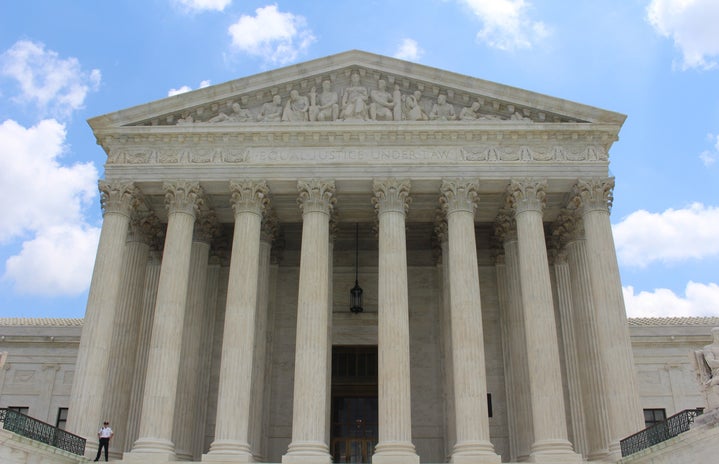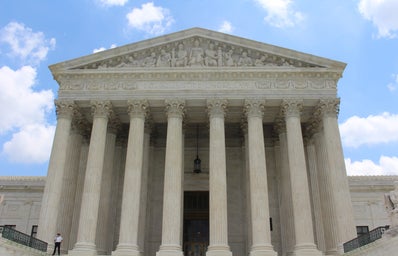So, it’s Percy Jackson week here at HerCampus UCSC, so exciting! But maybe you haven’t read the books or are a little fuzzy about greek mythology and need a refresher. Well, worry no more, your friendly neighborhood classics nerd is here. Below I have a quick crash course in the 12 gods and goddesses that make up the major players in the Greek Pantheon, plus two more that would smite me if I left them out.
Zeus
For the first god of the Pantheon we are starting with the king of the gods, Zeus. Zeus is the god of the sky and thunder. He, along with Poseidon and Hades, make up the three most important gods in greek mythology. Along with throwing lightning bolts, Zeus is known for sleeping around with both goddesses and mortals and fathered about half of the other gods on this list, which pisses off his wife. Zeus rules the Olympians (aka the greek gods) from atop Mount Olympus, a real mountain where it is believed the gods lived on top of in a castle in the clouds.
Hera
Hera is the goddess of motherhood, fertility, and family. Often depicted in a cape of peacock feathers, she is the queen of the gods as she is both wife and sister to Zeus (don’t ask, incest doesn’t count if you’re a magical immortal/theoretical being). Despite Zeus’ infidelity, Hera stays faithful to him, and lets out her anger about this by tormenting the women at the center of Zeus’ attention. Big yikes.
Poseidon
As god of the sea, Poseidon is an extremely important god for the Greeks, as they are surrounded by the Mediterranean on three sides. Poseidon is also believed to be the god that created horses, which is a little ironic that the sea god created a land animal but hey, I don’t judge. He is the god of earthquakes and many temples dedicated to him were found inland because of this. Poseidon also fathered Pegasus, ya know, the winged horse?
Athena
Ah Athena, everybody’s favorite goddess. Athena is the goddess of wisdom, war strategy, and crafts. She is a daughter of Zeus, the myth goes that she sprang fully formed from his forehead. Athena is a maiden goddess, which means that she never married nor had any children. Most myths surrounding her are about her guiding heroes on quests or where she must prove her wisdom and might. She is also one of the prominent gods in The Odyssey (which you should definitely read, I love the Emily Wilson translation).
Artemis
Another maiden goddess, Artemis is the goddess of archery and the hunt, and she is often depicted with a deer or hunting dog. Twin of god Apollo, Artemis also takes on the mantle of moon goddess from the goddess Selene later in history, but historians are unsure when this shift started. She is the protector of mothers in childbirth, after she helped her mother deliver Apollo. Artemis is also patron goddess of young women and chastity.
Apollo
Apollo is one of the most popular, and feared, gods in mythology. He is the god of archery, music, medicine, oracles, and the sun. The Greeks believed that he flew his golden chariot across the sky everyday, pulling the sun behind him. Arguably one of the most powerful children of Zeus (see, I told you he got around), Apollo disseminated his wisdom famously through the Oracle at Delphi.
Aphrodite
The oldest of the gods is Aphrodite. She is the goddess of love, beauty, and sex. Aphrodite was born from sea foam after her brother Kronos cut up their father Uranus into pieces and threw in the sea (Kronos and Uranus are Titans, which came before the gods. Yeah, she’s that old). The goddess is married to Hephaestus, though she had many affairs, including the god Ares.
Hephaestus
Hephaestus is the god of fire, blacksmiths, and metalworking. He is one of the few children of Hera and Zeus, though he probably wishes he wasn’t. Myth goes that when he was born crippled and ugly, Hera threw him down Mount Olympus. Hephaestus was married to Aphrodite by Zeus to avoid an internal war that was brewing over her hand. He was the blacksmith of the gods, creating all of their weapons, including Zeus’ lightning bolts.
Ares
Another child of Hera and Zeus, Ares is the god of war and bloodlust, the darker side of battle to Athena’s logic. Most of the other gods in the Pantheon did not like him, as he is believed to have, umm, a volatile temper. The different Greek city-state armies would make sacrifices to him to ensure victory in battle. The Spartans famously sacrificed dogs to the god. Two of his children are Phobos, god of panic, and Deimos, god of fear and dread.
Hermes
Hermes is the god of travel, luck, and in the Odyssey, is depicted as a messenger god. He is also the patron god of thieves and another child of Zeus’ affairs. You can usually tell if it’s Hermes in Greek art because of his winged sandals and double snake staff (not to be confused with the single snake staff of Asclepius, a medical symbol today). Hermes is known to be the most clever and mischievous of the gods.
Hestia
One you may not have heard of, but is no less important, is the goddess Hestia. Hestia is the goddess of the hearth and home, usually depicted with some sort of veil or hair covering. The oldest sister of Zeus, Hestia was one of the original major 12 of the Pantheon, but when Dionysis was born, she stepped down for him to take her place, saving the Olympians from civil war.
Dionysus
Dionysus, one of the most well known gods today, is the god of wine, fertility, theater, and ritual madness. He is the youngest of the Olympians and another child of Zeus. It is believed that Dioynsus was born from an affair between his mortal mother and Zeus, and after Zeus “accidentally” killed the mortal woman, Zeus sewed baby Dionysus into his thigh until the young god emerged. Dionysus is also the god of ritual sacrifices and is sometimes depicted as a bull.
Demeter
Demeter is the goddess of agriculture and the harvest. Many temples were built in her honor as the Greeks needed to keep her happy in order to have a good harvest. She is also the mother of Persephone, goddess of spring, who is born after Demeter has an affair with Zeus. According to myth, during the 6 months Persephone is in the Underworld, Demeter is so depressed and angry that she makes the land harsh and cold, giving us the winter season.
Hades
And last, but certainly not least, is Hades. Hades is the ruler of the Underworld, but he is not the god of death nor does he judge the souls that enter his domain—those jobs are left to other gods. He is the brother of Zeus and Poseidon, each of them ruling a third of the world: Zeus the sky, Poseidon the sea, and Hades the Underworld. He is most remembered for kidnapping the goddess Persephone and tricking her into eating 6 pomegranate seeds in order to force her to stay in the Underworld with him for 6 months every year. While an extremely important and feared god, Hades is not one of the major 12, as he is cast out from the rest of the gods.


